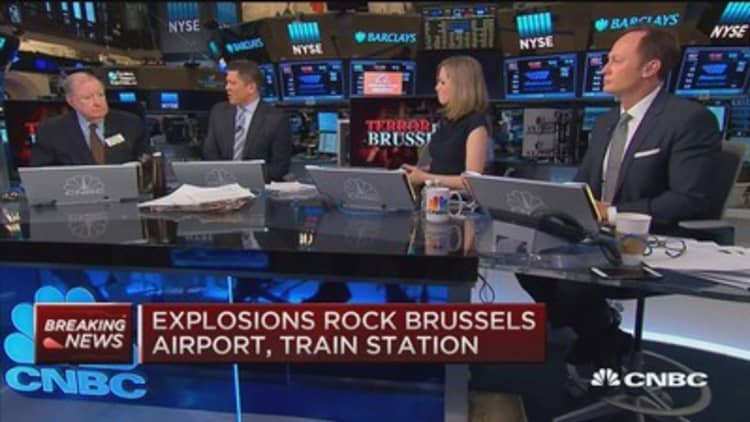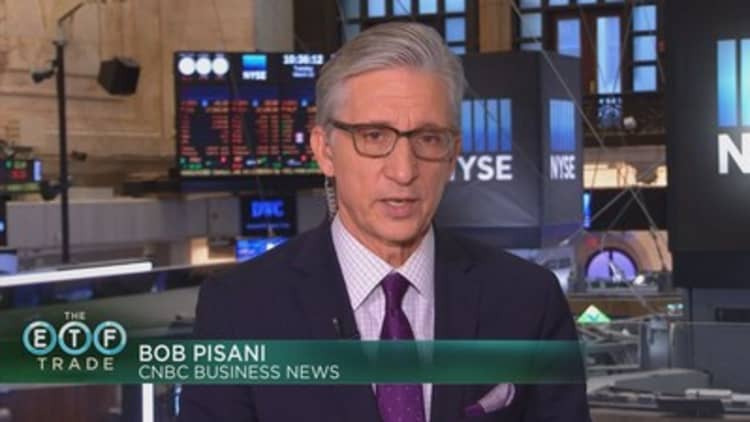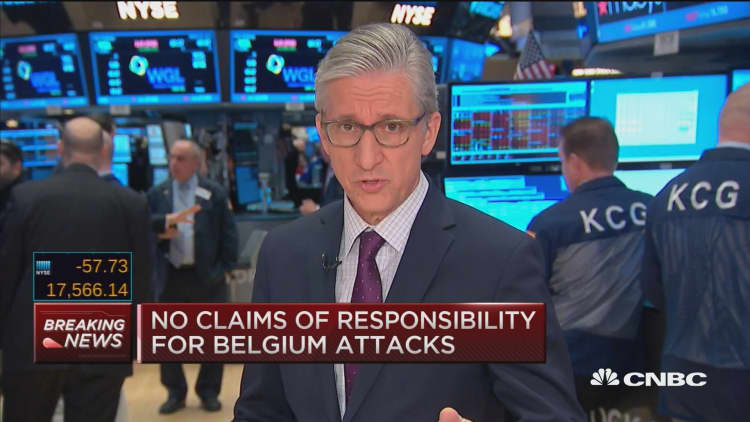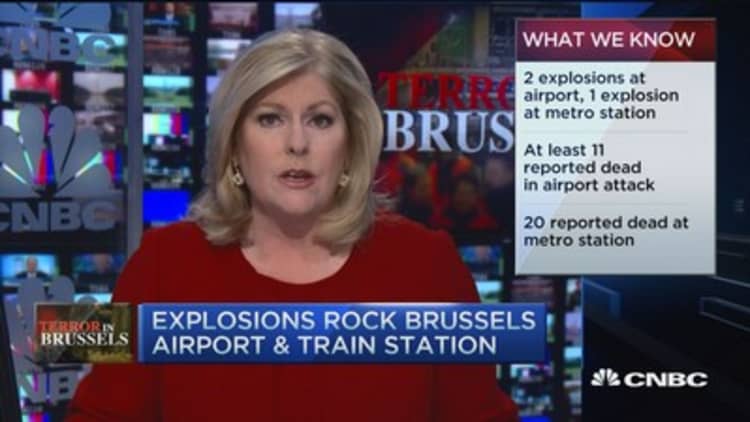



U.S. stocks closed mixed Tuesday after opening lower amid news of explosions in Belgium's capital that killed more than two dozen people at the airport and metro system. (Tweet This)
"It's been a pretty impressive response by stocks we had today given the news we had overseas and the run we've had over the last couple weeks," said Jeremy Klein, chief market strategist at FBN Securities.
The major averages tried for gains in intraday trade but the Dow Jones industrial average ended about 41 points lower to end seven straight days of gains. Goldman Sachs was the greatest contributor to declines in the index, while UnitedHealth contributed the most to gains.
The Nasdaq composite outperformed with gains of nearly 0.3 percent, posting its first five-day win streak since April last year. Apple closed 0.76 percent higher and the iShares Nasdaq Biotechnology ETF (IBB) gained 2.58 percent.
The S&P 500 snapped a four-day win streak as consumer staples led decliners. Health care closed up 0.9 percent to lead advancers.
As of an hour after the close, trade volume across the exchanges was the second-lowest of the year so far, barely topping Monday's low levels.
"I think people who need to allocate to equities are doing it regardless of news and people who don't need to allocate are just sitting on their hands," said Ilya Feygin, managing director and senior strategist at WallachBeth Capital.
"Everyone's trying to very thematically attack those spots that are directly exposed," he said.
Read MoreThe Belgium terror attacks: Complete coverage
The Dow transports underperformed, falling nearly 0.8 percent with Union Pacific off more than 2 percent and American Airlines closing 1.6 percent lower to lead decliners. Delta Air Lines ended nearly 1.5 percent lower, but off session lows. Norfolk Southern and Avis Budget were the only gainers.
"The tragedy just reminds us we're living in a dangerous world," said Art Hogan, chief market strategist at Wunderlich Securities.
"We've got a market that's focused on the human side versus the economic side, which is the right thing to do," he said, noting an initial flight to safety with the U.S. dollar index and gold higher, and Treasury yields and stock index futures lower.
Read MoreISIS claims responsibility for Brussels attacks: Reports
Dow futures were about 60 points lower, above session lows, ahead of the U.S. market open.
"U.S. stocks are positioned to pull back this morning on the back of weakness in Europe. Initial intraday support is about 20 points below current levels for the S&P futures, heightening downside risk for today/tomorrow," Katie Stockton, BTIG Chief Technical Strategist, said in a report. She also noted concern about a significant loss of momentum that would prompt overbought sell signals.
U.S. crude oil futures settled down 7 cents at $41.45 a barrel. Earlier, WTI hit a new 2016 high of $41.90 a barrel.
Treasury yields turned higher, with the at 0.89 percent and the 10-year yield at 1.94 percent.
The U.S. dollar index held 0.3 percent higher, with the euro near $1.1223 and the yen at 112.30 yen against the greenback. Sterling was near 1.4213, after hitting its lowest against the dollar since March 16.
European stocks came off session lows to close mixed, with the German DAX closing 0.4 percent higher and the STOXX Europe 600 off 0.15 percent.
"I think we're just following Europe, which closed well off their lows. … If they're shrugging it off, we're shrugging it off," said Peter Boockvar, chief market analyst at The Lindsey Group.
"If Europe closed up, why shouldn't we? That's the mentality," he said.
Read MoreBrussels attacks may sway Brexit vote: Strategists
Asian stocks were mixed, with the Nikkei 225 up nearly 2 percent and the Shanghai Composite about 0.6 percent lower.
In U.S. economic news, domestic home prices rose 0.5 percent in January on a seasonally adjusted basis from the previous month, according to FHFA. House prices were up 6.0 percent from January 2015 to January 2016.
Markit's flash U.S. manufacturing PMI was 51.4.
The Richmond Fed manufacturing index rose in March to 22, the highest since April 2010.
The Federal Reserve's decision not to raise interest rates last week but to wait until the central bank is more confident that inflation is headed towards its 2 percent goal is "appropriate," Chicago Fed President Charles Evans said in Reuters report Tuesday.
Philadelphia Fed President Patrick Harker is scheduled to speak in the evening.
"After a week like last week where you had three central bank meetings and quadruple witching, there's really not a whole lot going on this week with Good Friday and Easter being off," said Peter Coleman, head trader at Convergex. "It's not a dramatic move here."
Major U.S. Indexes
U.S. stocks squeezed out gains on Monday with the Dow Jones industrial average and S&P 500 ending at their highest levels of 2016. As of Monday's close, trade volume across exchanges was on pace for its lowest since Dec. 31.
Markets are closed Friday for Good Friday.
"In general, unless something happens, we're still in an uptrend, end of quarter uptrend," Coleman said.
Read More Early movers: AAPL, MFRM, DKS, PBR, GE, ZG, YHOO, ANF, WYNN & more
The Dow Jones industrial average closed down 41.30 points, or 0.23 percent, at 17,582.57, with Pfizer leading advancers and Goldman Sachs the greatest laggard.
Nike closed 0.28 percent higher ahead of its earnings report, scheduled for after the close.
The closed down 1.80 points, or 0.09 percent, at 2,049.80, with consumer staples leading seven sectors lower and health care the top gainer.
The Nasdaq composite closed up 12.79 points, or 0.27 percent, at 4,821.66.
The CBOE Volatility Index (VIX), widely considered the best gauge of fear in the market, traded just above 14.
About eight stocks declined for every seven advancers on the New York Stock Exchange, with an exchange volume of 839 million and a composite volume of nearly 3.4 billion in the close.
Gold futures for April delivery settled up $4.40 at $1,248.60 an ounce.
On tap this week:
Tuesday
Earnings: Nike, Cintas, Red Hat, Five Below, Krispy Kreme
6:30 p.m.: Philadelphia Fed President Patrick Harker speaks on growth and the role of economic policies
Wednesday
Earnings: General Mills, PVH, Eldorado Gold, Oxford Industries, KB Home
7 a.m.: Mortgage applications
10 a.m.: New home sales
10:30 a.m.: Oil inventories
5:30 p.m.: Philadelphia Fed President Patrick Harker gives welcoming remarks at a book launch
Thursday
Earnings: Accenture, Winnebago, GameStop
8:15 a.m.: St. Louis Fed President James Bullard speaks on the U.S. economy and monetary policy
8:30 a.m.: Durable goods
8:30 a.m.: Jobless claims
9:45 a.m.: Markit flash US services PMI
10:30 a.m.: Natural gas inventories
11 a.m.: Kansas City Fed survey
1 p.m.: Oil rig count
Friday
Markets closed for Good Friday
8:30 a.m.: 4th quarter GDP (third estimate)
8:30 a.m.: Corporate profits
*Planner subject to change.
More From CNBC.com:





